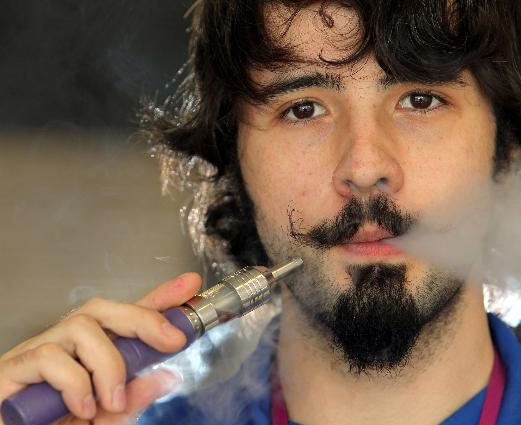Dickinson Press: Debate over on e-cigs as tobacco products overshadows bills restricting sales to minors
By Mike Nowatzki, Forum News Service
BISMARCK – Two bills being heard at the Legislature this week aim to keep e-cigarettes out of the hands of minors, but the burning issue is whether the nicotine-delivery devices should be classified as tobacco products, which would make them subject to additional taxes.
The North Dakota Department of Health believes e-cigarettes should be considered tobacco products because the nicotine contained in the liquid that’s vaporized by the battery-powered devices is derived from tobacco plants, said Krista Fremming, director of the department’s chronic disease division.
“Defining nicotine devices as tobacco products would allow the state to treat and regulate the sale of these products to minors in the same way the state treats and regulates the sale to minors of other tobacco products, such as conventional cigarettes,” she testified to the Senate Judiciary Committee on Tuesday.
Rep. Diane Johnson, R-Bismarck, prefers not to bring the tobacco-product issue into the debate. Her House Bill 1078 – one of two bills the House passed last month to ban the use of e-cigarettes by minors – refers simply to “nicotine devices,” defining them as “any noncombustible product that can be used by an individual to simulate smoking through inhalation of a substance that contains or delivers nicotine or any other ingredient.”
The bill had its first hearing before the Senate Judiciary Committee on Tuesday.
On Wednesday – the annual nationwide “Kick Butts Day” – committee members will take up the other House bill, HB 1186, which would make it an infraction to sell or give anyone under 18 an electronic smoking device or alternative nicotine product, or for minors to buy, possess or use them.
Fremming said the health department supports that bill’s requirements for child-resistant packaging and salesperson-assisted sales to limit e-cigarettes from being marketing to youths. But it’s still concerned that the bill defines e-cigarettes as non-tobacco products.
The bill’s prime sponsor, Rep. Kim Koppelman, R-West Fargo, has argued that while e-cigarettes use nicotine extracted from tobacco, they’re not tobacco products.
Koppelman was among the House lawmakers who voted to defeat a House bill that would have increased the excise tax on a pack of cigarettes from 44 cents to $1.54 while also defining e-cigarettes as tobacco products. He called it a back-door way to taxing e-cigarettes.
Mike Rud, president of the North Dakota Petroleum Marketers Association, said Tuesday the group supports Koppelman’s bill because it’s more comprehensive and opposes classifying e-cigarettes as tobacco products because the U.S. Food and Drug Administration is developing regulations for e-cigarettes.
“I think we’re going to see a lot of changes when those come out. There’s no sense in muddying the waters right now,” he said.
As of December, Minnesota and Vermont were the only states that taxed e-cigarettes and e-vapor products. Twelve state legislatures considered bills last year taxing e-cigarettes but didn’t pass them, according to Tobacco E-News, an industry publication.
In North Dakota, 23 cities have updated their ordinances to prohibit e-cigarette sales to minors, according to the North Dakota Center for Tobacco Prevention and Control Policy.
Three of those cities – Wahpeton, West Fargo and Grand Forks – require those who sell e-cigarettes to obtain a tobacco retailer license. That could become a state requirement if lawmakers classify e-cigarettes as tobacco products, which supporters say would reduce e-cigarette sales to minors.
Rud said most retailers have made a conscious decision not to sell e-cigarettes to minors, already treating them as tobacco products.
E-cigarette users argue the devices are safer than traditional cigarettes, are a useful tool for those trying to quit smoking and shouldn’t be subject to tobacco excise taxes. Fremming said the health department feels nicotine products approved by the FDA for tobacco cessation – which currently doesn’t include e-cigarettes – should be excluded from the definition of nicotine devices because their safety and efficacy is proven.
While the tobacco products definition will continue to be a source of debate, no opposition has surfaced so far to the idea of restricting e-cigarette sales to minors.
Fremming said the rate of North Dakota high school students who reported trying e-cigarettes nearly tripled from 2011 to 2013, from 4.5 percent to 13.4 percent, and high school students who have tried e-cigarettes are almost twice as likely to try conventional cigarettes.
At least 41 states currently prohibit sales of electronic cigarettes or vaping/alternative tobacco products to minors, including Minnesota and South Dakota, according to the National Conference of State Legislatures.
Whitney Klym, a senior at St. Mary’s Central High School in Bismarck and a member of its SADD group, told the committee Tuesday she has seen e-cigarettes used at school, parties and other events by students as young as 14.
“It is becoming a dangerous social norm among youth,” she said.


